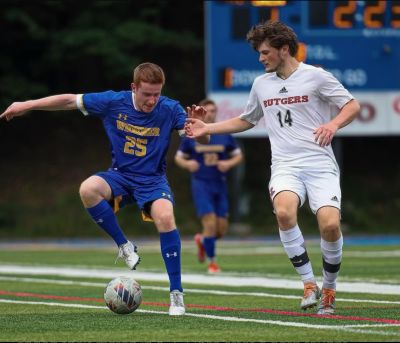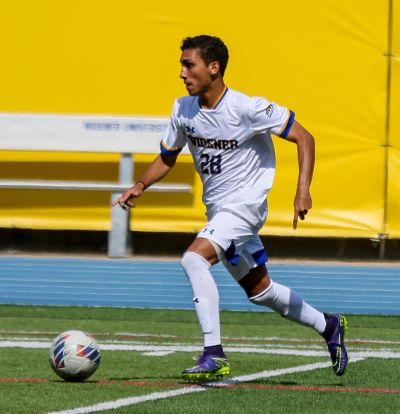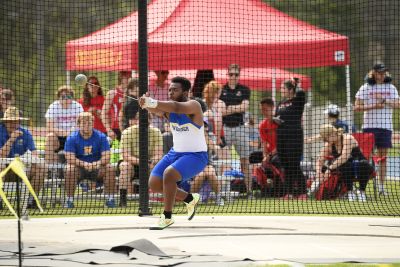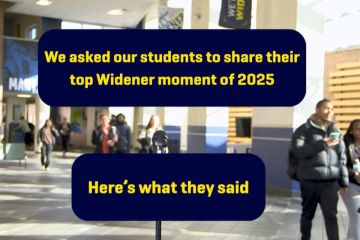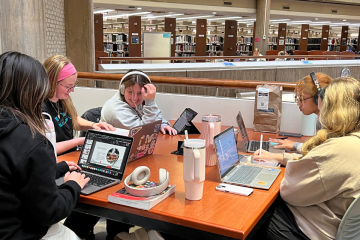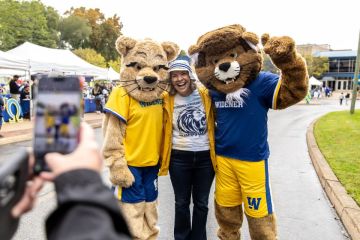The Wide(ner) World of Sports

Bruce McGarvey first stepped foot on Widener’s campus one week before classes began in August.
It was not only his first time at the university, but his first time in America.
A transfer student from Scotland, McGarvey arrived at Widener to study biomedical engineering and to play soccer. And yes, he’s adjusted his language for the sport he loves, dropping his native term of “football."
“The opportunity to go to America to play soccer and continue my studies really appealed to me,” he said. “It was one of those once-in-a-lifetime opportunities.”
It was also a leap of faith, to travel so far from home, family, and everything he’s known to study and play at Widener. McGarvey and his parents spent months chatting with men’s head soccer coach, Ross Liberati, but only via Zoom.
The risk has paid off. The junior says he was immediately welcomed by the team and the university community as a whole, and feels as though he belongs here.
“Everyone has been really, really friendly right from the get-go,” said McGarvey, who has already developed a great appreciation for Wawa and is trying to figure out the rules of American football. “It’s entertaining but the first time I watched I was completely lost. It doesn’t make sense.”
McGarvey is not the only international student playing for the Pride this year; several are on the rosters for soccer and track and field.
These student-athletes have found a second home in America, at Widener, and in wearing the blue and gold. They have been embraced by coaches, teammates, classmates, and professors, who have helped them acclimate to their new environment, introducing them to local food, culture, and traditions, on campus and off.
In turn, these international students bring a new perspective to their teams and to the campus.
“The team has been very welcoming,” said accounting major Hector Suriel ’26, a native of the Dominican Republic, who plays soccer for the Pride alongside McGarvey.
Teammates get another culture, they ask questions. There are many differences between the Dominican Republic and here, but they take you with their arms open. — Hector Suriel
McGarvey and Suriel are following in the footsteps of other international students who have played soccer for the Pride over the years; past players have hailed from England, Germany, the Netherlands, and Saudi Arabia, among others. Liberati attributes this global representation to the nature of the sport.
“It’s the world’s game and the most widely played,” said Liberati. “We should build a roster to reflect what the world looks like. We would be remiss if we didn’t recruit internationally. And I have always found that international students who decide to take this route bring a certain level of maturity and a worldview.”
Liberati says his international players also bring a different style of play to the pitch. American soccer players tend to be more physical, whereas McGarvey is more technical and Suriel brings a flair – all of which provide balance and complement the squad, which is off to a strong start this season.
International student-athlete Conrad Howell ’23, a member of the track and field team, hails from the islands of Turks and Caicos, and followed in his sibling, Gel’s, footsteps to Widener and to Coach Vince Touey’s roster. Howell throws shot put and hammer.
An economics major, Howell felt the “homey” feel of Widener when he first helped Gel move to campus.
“I liked the vibes. The campus wasn’t too big. And to hear Gel talk about it and the stories, how nice the people are,” he knew he wanted to be part of the Pride, too. In addition to athletics, Howell is a residential assistant and trombone player in the marching band.
Howell has found a strong support system on campus, led by Touey, who has gone above-and-beyond to help him. Last Thanksgiving, Howell had a toothache and needed to see a dentist. But he’s accustomed to a free healthcare system back home and didn’t know how to navigate the American system. Touey stepped in to help.
“Coach Touey is great, really makes you feel like you’re valued. He’s invested in all our lives,” said Howell.
Turks and Caicos has only one track and field stadium, and Howell is still blown away by Widener’s athletic facilities to the point that “whenever I go home, I’m low-key sad,” he said. Back home, no track and field athlete throws hammer, so Howell believes he is, by default, the Turks and Caicos record holder.
Like soccer, track and field has counted several international students on its roster over the years, perhaps most notably Macharia Yuot ’07, a six-time national championship runner. A Lost Boy of Sudan, Yuot, as a child, walked hundreds of miles to flee his war-torn village in Sudan and lived for years in refugee camps before coming to the United States and eventually enrolling at Widener.
Touey, now in his 35th year coaching at Widener, says the university is well-positioned for international student-athletes because it “can provide this [welcoming] environment, given what our daily in-and-out mission is. It’s a built-in characteristic of who Widener is.”
Lifelong soccer player Dwayne Hickerson Jr. ’22 felt that warm and friendly environment when he arrived at Widener. A native of Germany, Hickerson completed his undergraduate degree in his home country and found himself working for SAP, a global software company, at its U.S. headquarters in Newtown Square, Delaware County.
In 2019, Hickerson decided to pursue his MBA in data analytics. Widener was nearby, offered the program he wanted to pursue, and the chance to play soccer for the Pride.
“It was a good match. The campus was really nice, and there was support from the school. I didn’t experience anything like that in Germany,” said Hickerson.
Liberti and the team accommodated Hickerson’s work and class schedule, and though his playing time was cut short by COVID and an injury, Hickerson “loved the team. It was positive all around,” he said.

